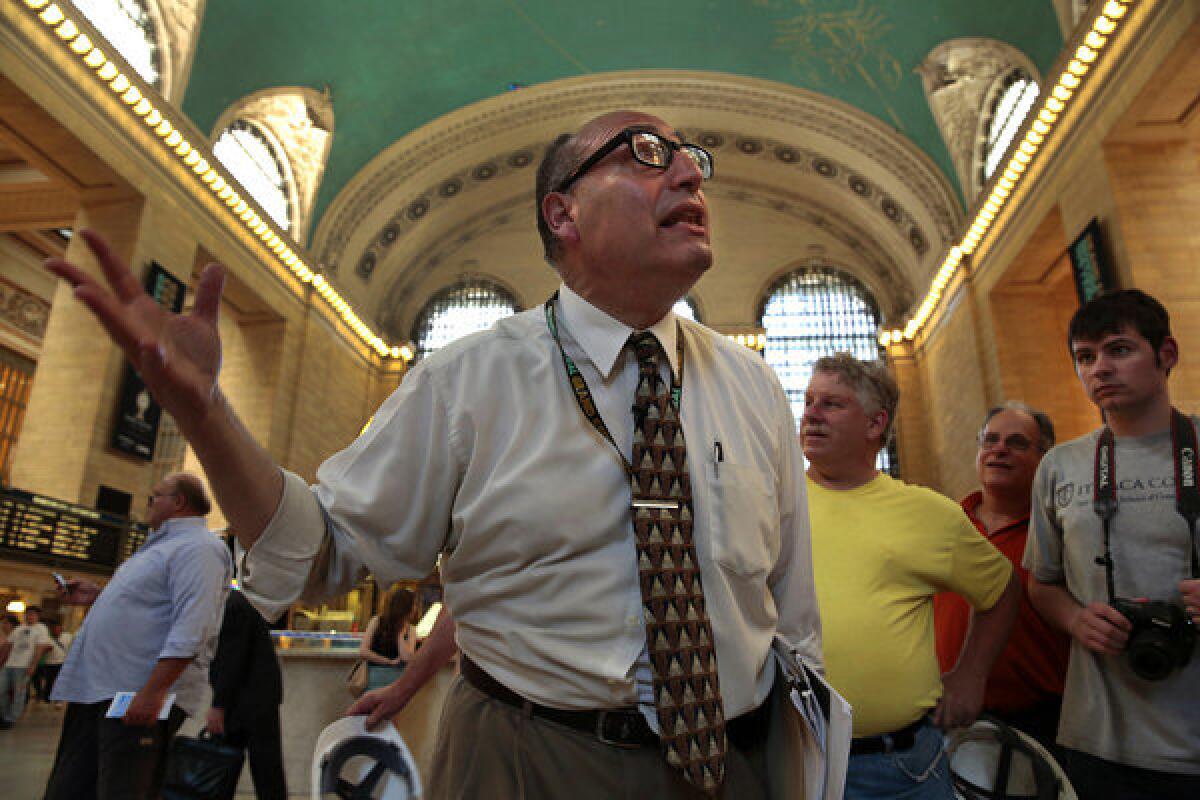Kidnapped iPhone roams far from home
- Share via
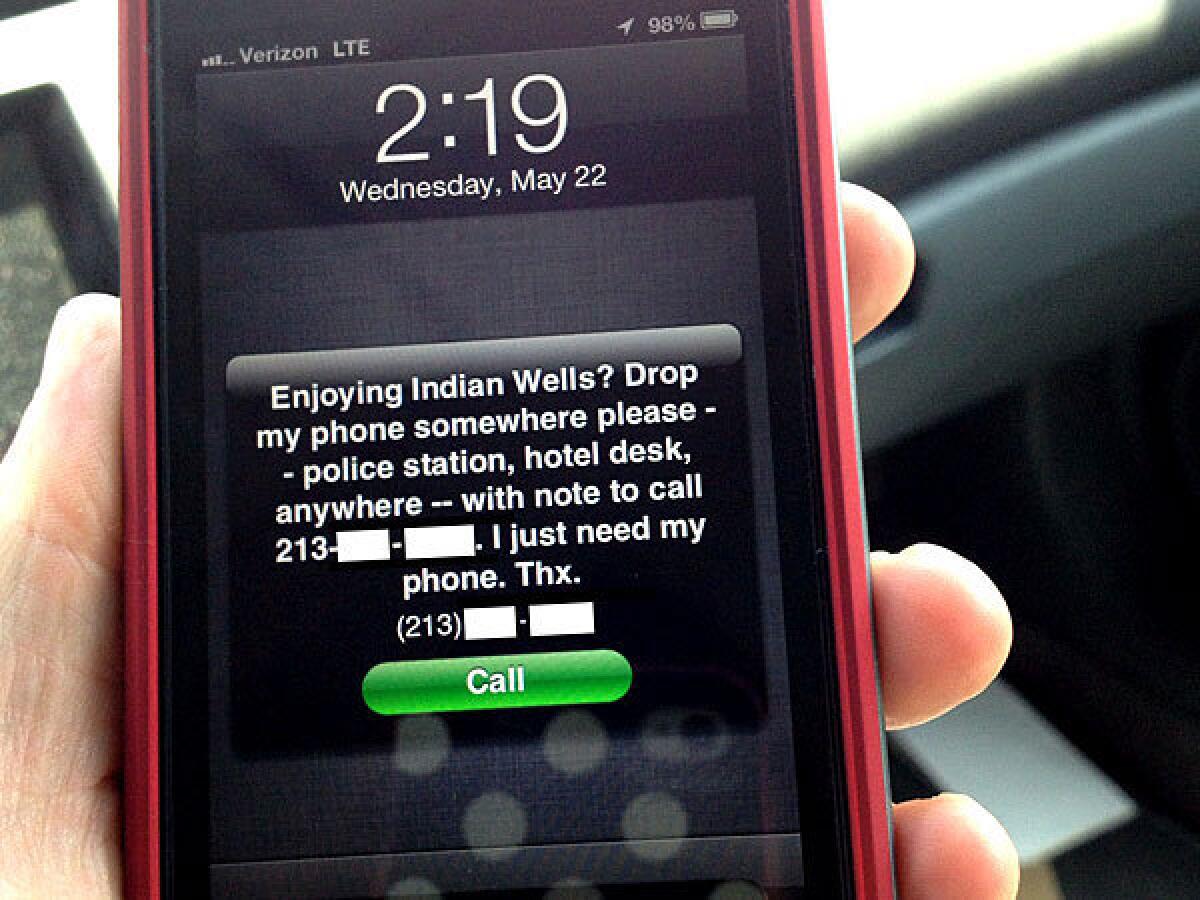
My iPhone had been kidnapped.
It was sending me cries for help.
Each time it was powered on, it beamed an SOS, giving me an exact street address.
I studied the images on my computer screen, zooming in close.
The tidy lawn of a one-story home, the boxy exterior of a duplex.
My iPhone was on the move. Modern technology told me where.
But how on Earth was I going to get it back?

My iPhone is my atlas and my encyclopedia.
As @latimescitybeat on Twitter, I'm on it day and night.
I use it to take photos to document my stories and my life. It's my digital diary, my portable show-and-tell.
I'd misplaced it before, at home, and finding it was a breeze. All I had to do was go to my computer, launch the "Find My iPhone" app and wait.
A registered device, if turned on, will pop up on a map. It can even announce itself: Ping, ping, ping, like a knife tapped on crystal.
I've followed that sound to a tangle of sheets, to the dark cave below my driver's seat.
This time the hunt would be different.
After taking a photo of strawberries at the Hollywood Farmers Market one Sunday morning, I had tossed my phone into my bag. A few minutes later, when I reached for it, my hand grabbed at air.
I'd been buying Ojai tangerines. I thought the phone might have slipped under some fruit, but it hadn't. And when friends called it, no one answered. We heard no ring.
Minutes later, in my home office, I signed onto Find My iPhone.
It found an iMac and iPads in the house. But the app informed me that my phone was offline.

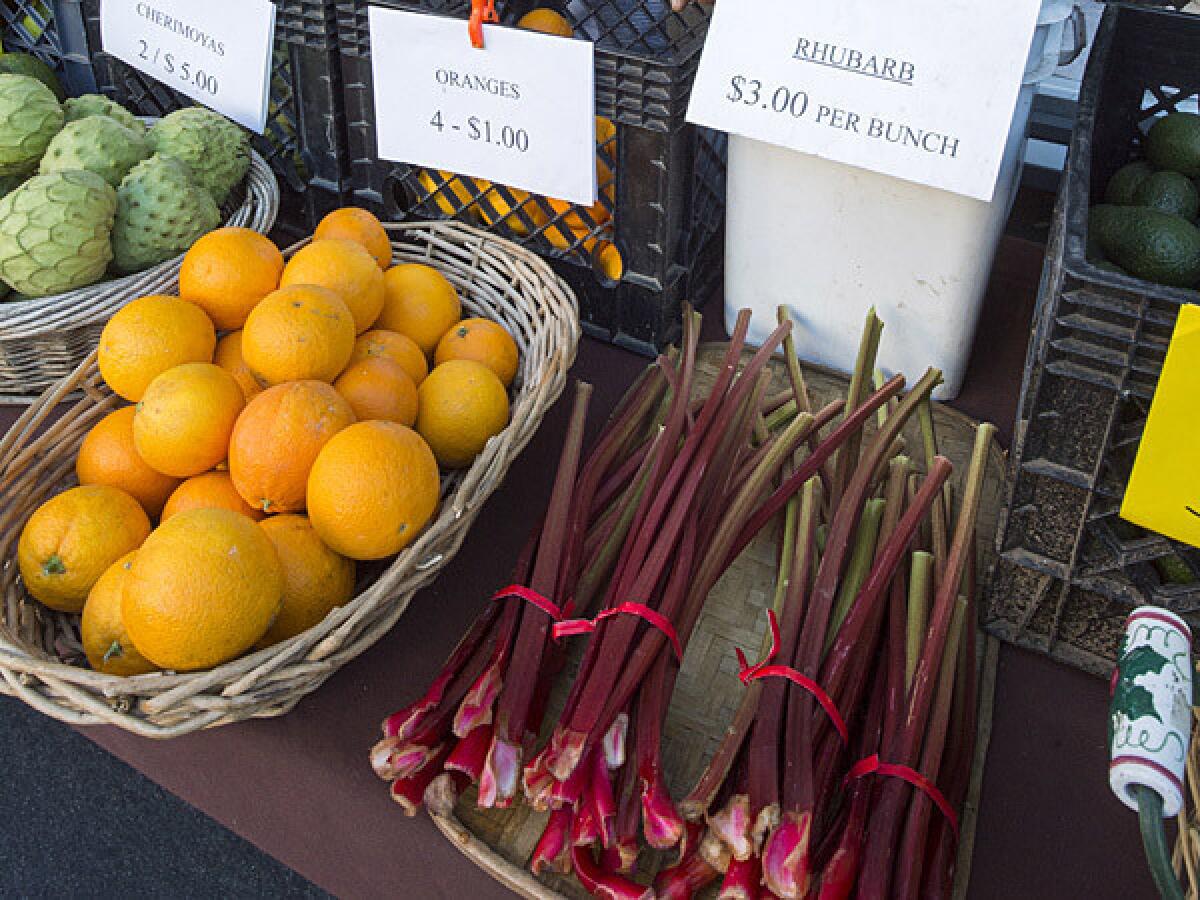
The app first showed the missing iPhone at the place it disappeared: the Hollywood Farmers Market. (David Karp / For The Times)
"This phone has been lost by a Los Angeles Times reporter who needs it urgently. Please call..."
"I desperately need my phone. Please call..."
"I'm a good person. I need my phone..."
"Please call..." "Please call...." "Please call..."
My phone was locked. It required a password to get past my dog on the home screen. My plan of attack was to bombard it with text messages, which pop up anyway.
They'd provide the means for a good person who found it to contact me — and just might give a jumpy thief pause.
I texted. I kept refreshing Find My iPhone.
At 2:19 that afternoon, my vigilance paid off.
My iPhone, according to the app, hadn't gone far. It was on the site of the now-closed market.
I felt my shoulder muscles unkink as I pictured the happy ending.
Someone had given it to the market staff. A farmer had found it while packing up a stall. My home phone was about to ring.
I waited for the call.
Instead, my iPhone again fell off the grid.
I watched and I fretted until 3:53, when it showed up — in Santa Ana.

My phone had been swiped. I had an address where it seemed to be. I called the police.
The woman who answered outlined the policy: They would go, but only if I went along.
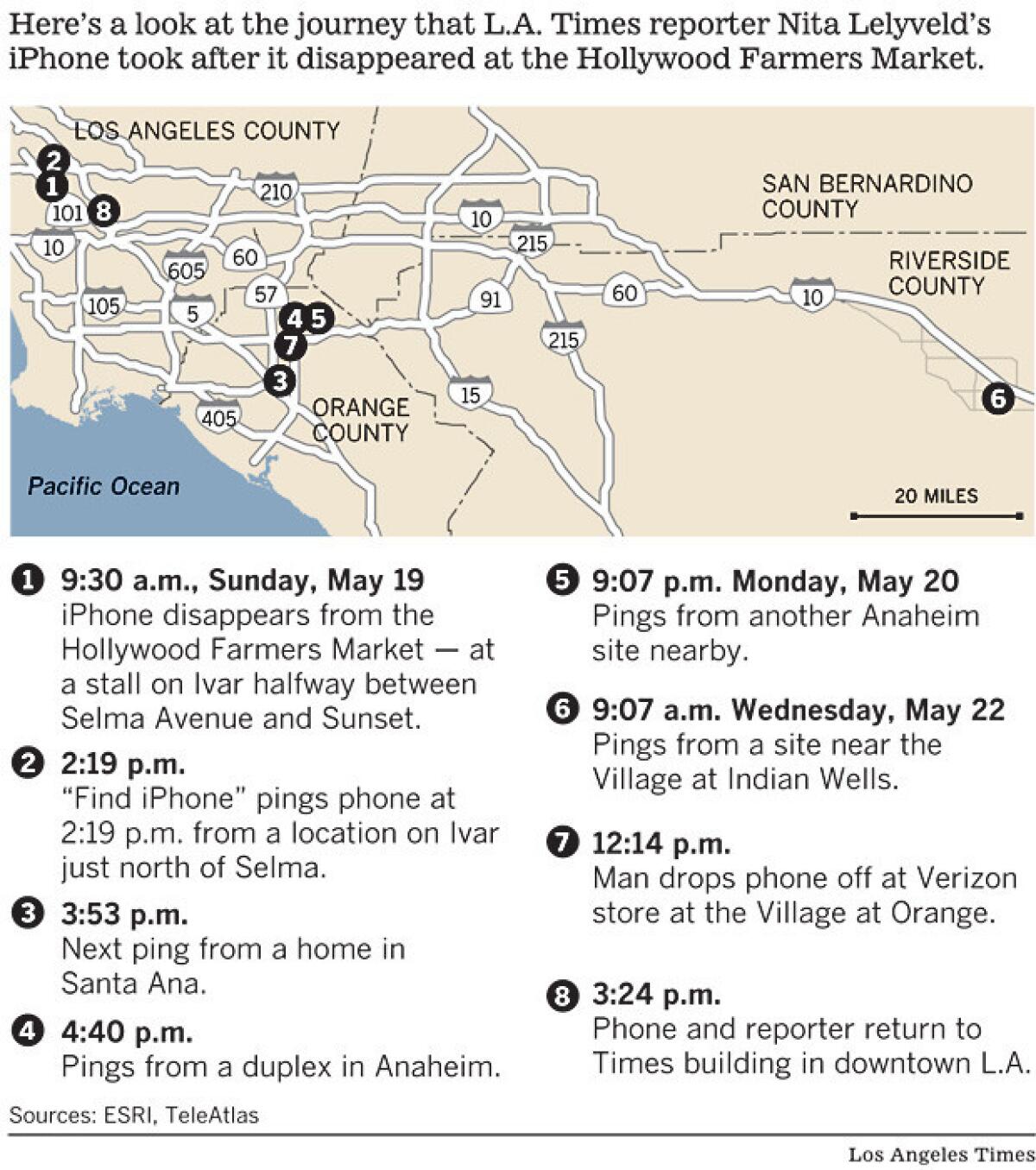
An officer would accompany me to the door and ask if the phone was there. If the answer was no, that would be that, the officer would leave.
I hung up and, for a minute, contemplated the drive. Then I called The Times' news research library.
In no time, I had left a phone message for someone listed at the address.
Half an hour later, I was chatting with a friendly man who seemed genuinely concerned. He kept telling me how lost he'd be if he ever lost his iPhone.
But he wasn't sure how he could help, he said. No one in his family had gone anywhere that day.
He called back to say he'd considered each of his neighbors, and saw no plausible suspects.
I thanked him for his efforts — though by then they hardly mattered.
At 4:40 p.m., my iPhone had resurfaced in what appeared to be in a duplex in Anaheim.

By now I'd realized that everything on my phone was backed up. This wasn't about lost photos — or even, really, the phone.
I felt toyed with. I was angry. I was ready to get mean.
I'm watching you! Return my phone. ... I'm tracking you. I know where you are."— Nita Lelyveld
I decided I would make my phone play its "find me" ping each time it was turned on.
I had also discovered that if I put it in something called Lost Mode, I could have it display a big message — filling the screen.
To Anaheim, I sent stern words: "I'm watching you! Return my phone."
I played the sound, too, several times — until the phone was turned off.
When it came on again at 9:07 that night, I was locked and loaded.
Ping, ping, ping.
"I'm tracking you. I know where you are."

Monday passed without a trace. So did Tuesday.
Maybe I'd gone too far.
My boss ordered me a new phone.
Still, I gave it one more shot, sending new words to pounce if my old phone was turned on again:
"This phone has been disabled. You can't use it. Please return it."
By Wednesday morning, I had stopped obsessing.
So when the alert came, I missed it by a few minutes.
At 9:07 a.m., my phone had signaled from Indian Wells. Before it was turned off again, I got in one more ping, ping, ping and this message:
"Enjoying Indian Wells?" I wrote. "Drop my phone somewhere, please..."

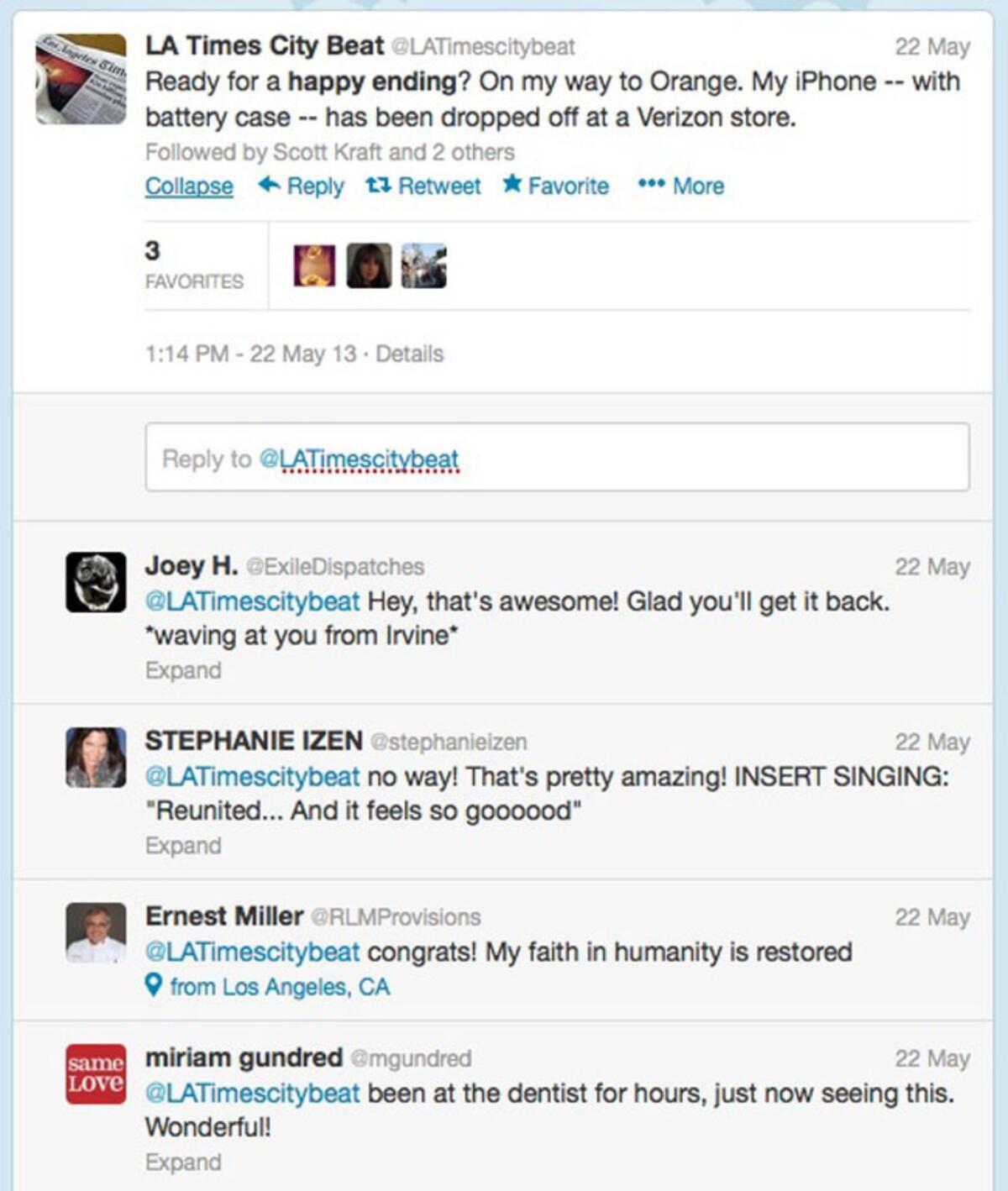
Twitter messages about the recovery of the reporter's iPhone. (Twitter)
I beamed. I bounced up and down. Everyone near me in the newsroom saw it.
When a nice woman at a Verizon store in Orange called to tell me that she had my phone, I looked as if I'd just spotted the Publishers Clearing House Prize Patrol.
I was about to run to my car when a second call came in. The number was blocked. The person didn't give his name.
He told me he'd found my phone at the market, but it was too late to turn it in to security.
He'd just dropped it off in Orange, he said. He seemed to want my approval.
I asked about all my messages and why he hadn't called earlier?
He suggested he hadn't seen any of them because he hadn't wanted to turn my phone on.
It didn't make sense. I knew it. But suddenly I no longer cared.
My iPhone had been kidnapped. I'd heard its cries.
I felt triumphant as I raced to its rescue.
| Lelyveld writes the City Beat column. Follow City Beat @latimescitybeat on Twitter and at Los Angeles Times City Beat on Facebook. |
More great reads
'Little' Al Robles' big job: Make his own name in politics
People say, 'Why do you do that? People see you hanging around corrupt politicians.' "
Sign up for Essential California
The most important California stories and recommendations in your inbox every morning.
You may occasionally receive promotional content from the Los Angeles Times.
